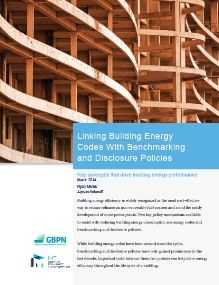Building energy efficiency is widely recognized as the most cost-effective way to reduce reliance on non-renewable fuel sources and avoid the costly development of more power plants. Two key policy mechanisms available to assist with reducing building energy consumption are energy codes and benchmarking and disclosure policies.
While building energy codes have been around since the 1970s,benchmarking and disclosure policies have only gained prominence in the last decade. Important links between these two policies can help drive energy efficiency throughout the life cycle of a building.
Although building energy codes and benchmarking and disclosure policies have traditionally been viewed as separate policy instruments, many harmonies exist between them that need to be explored. Recognizing these will allow the policies to be most effectively implemented and allow jurisdictions to realize the maximum benefits from these policies.
